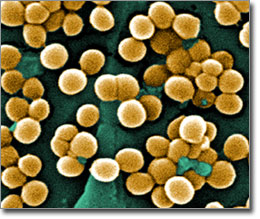In addition to the strains of MRSA that arose in hospitals and the community, there is one that seems to correlate pretty strongly with pig farmers and, in many cases, is present in both the farmers and their stock. Bonnie Powell, founder of The Ethicurian blog, interviewed journalist (and AHCJ member) Maryn McKenna about MRSA and the recent discovery in the Netherlands of a strain linked to commercial pork production.

CDC/Janice Haney Carr
This 2005 scanning electron micrograph depicts clumps of methicillin-resistant Staphylococcus aureus bacteria. Magnified 9560x.
[The presence of a clear link between factory farms and human cases of the pig-linked MRSA ST398 strain] depends on your standards of evidence. MRSA ST398 has been found colonizing pig farms and pig farmers in the US, Canada, and in the European Union. You can argue about how prevalent it is — it’s easy to cast doubt on whether it is common, because not very many studies have been done. But you can’t argue that it is there.
The argument over whether ST398 in pigs is causing MRSA disease in humans is more subtle. It definitely has in the Netherlands, though not often so far. Has it done so in the US? No one has done the microbiology to tell.
As for the food supply, McKenna says it’s theoretically possible to contract MRSA from meat.
If MRSA ST398 is in pork — it’s been found in Canada and Europe, but not here yet — then the issue is not eating the pork (as long as you cook it), but rather handling it. It is possible that you could handle raw pork, unthinkingly touch your eyes or nose, and colonize yourself.
McKenna, who is writing “Superbug: The Rise of Drug-Resistant Staph and the Danger of a World Without Antibiotics,” urges better testing and monitoring of MRSA and the outbreaks thereof, and cautions that, even if they are not yet shown to harm humans, resistant drug strains are still a matter of public concern.
McKenna also wrote a comprehensive primer for AHCJ to help educate reporters about MRSA and the surrounding issues.




